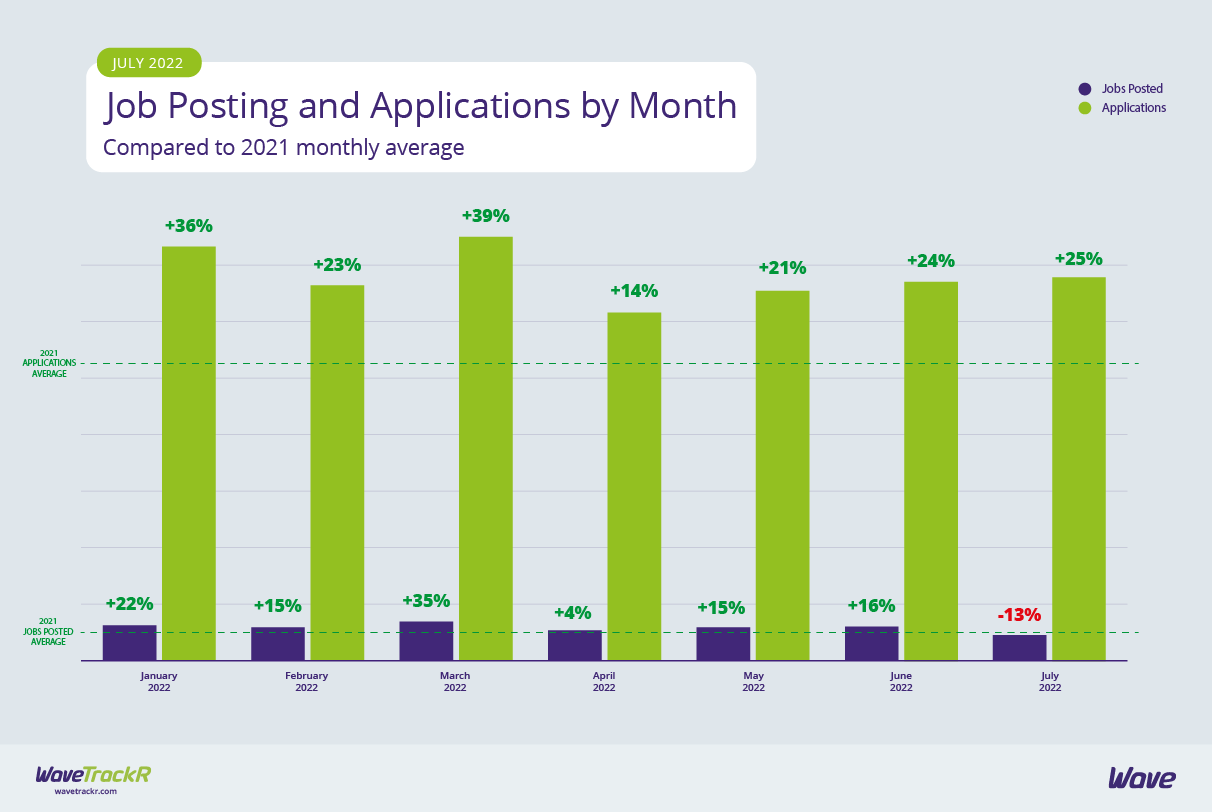After two months of jobs and applications figures effectively plateauing, the WaveTrackR July 2022 Recruitment Trends Report has revealed that jobs are at the lowest level so far recorded in 2021. At 13% under the 2021 monthly average, it’s the first time all year they’ve dropped below that average and it marks a substantial reduction in the number of jobs in the market when looking at this year’s trend to date. Month on month is even starker, with July’s jobs figures 25% below June’s. It seems we may now be seeing the tangible effects on business confidence from rising inflation, soaring prices across the board, and the ongoing war in Ukraine.
What is positive is that application numbers are holding. The WaveTrackR report registered a 1% increase both over June’s application figures and the 2021 monthly average. This difference in job and application activity has resulted in a higher average number of applications per job, rising by 4 from June to 15. This will at least be welcome news to recruiters who, over the past 18 months, have struggled to attract candidates from a diminishing pool to soaring numbers of jobs. Of course, alongside caution brought about by the war and rising costs, this may be partly the reason for the falling number of jobs - with skills shortages at an all-time high, employers have been re-thinking their plans for growth.
According to the S&P Global / CIPS Flash UK Composite Output Index, UK economic growth registered the slowest expansion since the early 2021 lockdown. This is undoubtedly having an effect on business growth plans, leading to the significant slow-down in job creation. Whilst soaring costs may be having a negative effect on jobs, it could be contributing to rising applications, particularly among the economically inactive, some of whom may now be seeking employment to help with the cost of living. The ONS Employment in the UK report for July noted a decrease in the economic inactivity rate from March to May, which had risen hugely during the pandemic and continued to be high in the months following the re-opening of the economy. The ONS found that during these three months, economic inactivity fell by 0.4 percentage points from the previous three month period, largely amongst those that said they did not want a job.
As always, average figures don’t tell the full story across all industries. Whilst other industries curb staff expansion, It & Internet increased their dominance in both jobs and applications activity, posting 25% of all jobs and receiving a staggering 28% of all applications. When looked at across the year to date, IT & Internet jobs have actually been gradually decreasing over the past two months but at a slower rate than other industries. It is, however, the only industry to have received a steeply increasing number of applications, with all other industries registering declining application figures. The fast growth over the last three months is perhaps driven by recent layoffs in the tech industry.
Health & Nursing remains in the top 5 industries for jobs, second only to IT & Internet. However, although it posted 15% of all jobs, it didn’t register in the top 5 for applications. In fact, applications have been slowly decreasing throughout the year. Unsurprisingly, skills shortages in the sector have resulted in low average numbers of applications per job across the year, with July’s being just 3 compared to the industry average of 15. Travel, Leisure & Tourism, constantly in the news for airline and airport staff shortages causing huge problems this summer, received an average of just 2 applications per job in July. Other industries affected by skills shortages, with low average numbers of applications per job, include Public Sector, Not for Profit and Social Services. On the flip side, Customer Services, Finance, Sales, Secretarial, PAs & Administration, and Engineering & Utilities all received relatively high average numbers of applications per job.
Manufacturing is notable for its sharp decline in applications from March, mirroring a decline in jobs, though the trajectory is less severe. The S&P Global / CIPS Flash UK Composite Output Index showed Manufacturing sectors were struggling to cope with higher commodity prices, resulting in the first contraction of output since May 2020. However, the industry still took 5% of all jobs and 10% of all applications, possibly indicative of the general trend across all sectors (other than IT & Internet) of decreasing activity.
When it comes to assessing the industries in demand, it’s often helpful to look at the average application per job board figures. In that regard, it’s no surprise that IT specialist CW Jobs tops both the generic and generalist job boards alongside TotalJobs/Jobsite, both receiving an average of 13 applications per job. Secs in the City, specialising in Secretarial, PAs & Admin, and Caterer, specialising in Hospitality & Catering, both received an average of 12 applications per job. Reed and CV Library facilitated an average of 5 applications per job each.
If you’re wondering which day of the week you should be posting your jobs, it’s helpful to know that most applications in July were received on a Tuesday. The majority of jobs were posted on a Monday, proving that getting your jobs out at the beginning of the week will enable you to catch candidates when they’re most active and ready to apply.
The steep decline in jobs is certainly attention-grabbing but it is worth noting that this comes off the back of soaring jobs figures and plummeting application numbers. This may just be the market settling. However, with the news full of warnings that the UK is heading for a recession that will begin in the final three months of 2022, we are likely to see an increase in businesses slowing their hiring plans.







